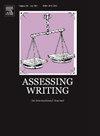小学英语写作评价的判断准确性:文本特征重要吗?
IF 5.5
1区 文学
Q1 EDUCATION & EDUCATIONAL RESEARCH
引用次数: 0
摘要
评估小学生学习英语的写作能力是一项具有挑战性的工作。本研究旨在考察文本特征在写作评价中的作用,并分析了文本质量(交际效果、细节水平、连贯、衔接、句法和语法复杂性、句法和语法正确性、词汇、正字法和标点)九个方面区分的判断准确性。200名职前教师评估了随机分配给六年级学生的四篇课文。他们的评估与先前研究中两位专家的现有评级进行了比较。我们发现r = 之间的相对判断精度。9项评估标准分别为34和0.60,其中词汇量的评估比几乎所有其他标准都要准确得多。正字法、句法复杂性和正确性、语法和标点的准确性明显高于衔接、细节水平、交际效果和连贯。职前教师比专家更严格地评估了大多数标准,并且具有更高的可变性。结果表明,教师教育应为职前教师提供实践写作评估的具体机会,开展活动以加强与内容和结构相关的标准评估,并帮助他们调整评估的严谨性。本文章由计算机程序翻译,如有差异,请以英文原文为准。
Judgment accuracy in primary school EFL writing assessment: Do text characteristics matter?
Assessing the writing competence of pupils learning English as a foreign language (EFL) at primary school is challenging. This study aimed at examining a largely unexplored topic, namely the role of text characteristics in writing assessment, and analysed judgment accuracy differentiated by nine aspects of text quality (communicative effect, level of detail, coherence, cohesion, complexity of syntax and grammar, correctness of syntax and grammar, vocabulary, orthography and punctuation). Two hundred pre-service teachers assessed four randomly assigned texts from learners in grade six. Their assessment was compared to the existing ratings of two experts from a previous study. We found a relative judgment accuracy between r = .34 and .60 for the nine assessment criteria, with vocabulary being assessed significantly more accurately than almost all other criteria. Orthography, complexity and correctness of syntax and grammar and punctuation were rated with significantly more accuracy than cohesion, level of detail, communicative effect and coherence. The pre-service teachers assessed most criteria more strictly and with higher variability than the experts. The results suggest that teacher education should offer pre-service teachers concrete opportunities to practise writing assessment, implement activities to strengthen the assessment of content- and structure-related criteria, and help them adjust their assessment rigour.
求助全文
通过发布文献求助,成功后即可免费获取论文全文。
去求助
来源期刊

Assessing Writing
Multiple-
CiteScore
6.00
自引率
17.90%
发文量
67
期刊介绍:
Assessing Writing is a refereed international journal providing a forum for ideas, research and practice on the assessment of written language. Assessing Writing publishes articles, book reviews, conference reports, and academic exchanges concerning writing assessments of all kinds, including traditional (direct and standardised forms of) testing of writing, alternative performance assessments (such as portfolios), workplace sampling and classroom assessment. The journal focuses on all stages of the writing assessment process, including needs evaluation, assessment creation, implementation, and validation, and test development.
 求助内容:
求助内容: 应助结果提醒方式:
应助结果提醒方式:


